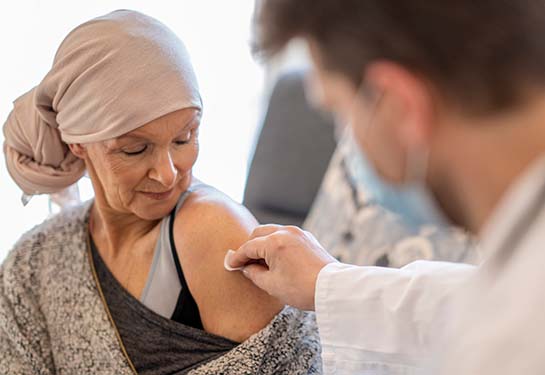COVID-19 vaccine critically important for cancer patients
New study indicates people with current cancer diagnosis may face severe complications from COVID-19
A new study found that a current cancer diagnosis posed a significant risk for severe outcomes during the first two years of the COVID-19 pandemic, including ICU admission and death. UC Davis Comprehensive Cancer Center researchers took part in the study, which was published this week in Cancer Epidemiology, Biomarkers & Prevention.
“This was the second-largest study of COVID-19 patients in the United States, and it was funded by the National Cancer Institute (NCI),” said Elisa Tong, UC Davis internist and cancer prevention researcher. “The results showed that getting the COVID-19 vaccine significantly reduces the risk of death for cancer patients who develop COVID-19.”
The study was led by researchers from the University of Wisconsin and included 104,590 patients at 21 health systems across the United States. The sample included hospitalized patients who were diagnosed with COVID-19 from February 1, 2020, through September 30, 2021. A total of 7,141 (6.8%) had a current diagnosis of cancer while 6,749 (6.5%) had a past history of cancer.
Bottom line, what’s important for current cancer patients to know is that it is critically important to be fully vaccinated against COVID-19 and up to date on your boosters.”—Elisa Tong, UC Davis internist and cancer prevention researcher
“UC Davis was selected as one of the 21 health systems to contribute diverse patient data for this nationwide COVID-19 research,” said Tong. “We have been part of the NCI Cancer Center Cessation Initiative since it began in 2017 and our skillful research informatics team was key in making it possible to join such an ambitious research initiative at the beginning of the COVID pandemic.”
Seven types of cancer were examined (leukemia, multiple myeloma, lymphoma, prostate, breast, lung/bronchus, and digestive). All except cancer of the prostate were associated with a higher likelihood of in-hospital mortality compared with no current or past cancer history. Stronger associations were noted for metastatic and hematologic (blood) cancers relative to non-metastatic solid tumor cancers.
“An encouraging finding was that individuals with a past history of most types of cancer who were infected and hospitalized with COVID-19 were not at higher risk for severe outcomes, including death, compared to those with no current or past cancer history,” said Wendy Slutske of the University of Wisconsin, senior author of the paper. “This is an important and hopeful finding because cancer survivors represent an increasingly large segment of our population, due to advances in prevention, early detection and treatment.”
“While mortality and ICU admission rates for COVID-19 decreased during the course of the pandemic, the increased risk of current cancer on severe outcomes from COVID-19 remained constant across the first two years of the pandemic (2020 and 2021),” said lead author Margaret Nolan of the University of Wisconsin.
Moreover, vaccination prior to COVID-19 hospital admission substantially decreased the risk of ICU admission and death, regardless of cancer status. Both patients with and without cancer appeared to benefit from vaccination.
“Bottom line, what’s important for current cancer patients to know is that it is critically important to be fully vaccinated against COVID-19 and up to date on your boosters,” Tong said.
UC Davis Comprehensive Cancer Center
UC Davis Comprehensive Cancer Center is the only National Cancer Institute-designated center serving the Central Valley and inland Northern California, a region of more than 6 million people. Its specialists provide compassionate, comprehensive care for more than 100,000 adults and children every year and access to more than 200 active clinical trials at any given time. Its innovative research program engages more than 240 scientists at UC Davis who work collaboratively to advance discovery of new tools to diagnose and treat cancer. Patients have access to leading-edge care, including immunotherapy and other targeted treatments. Its Office of Community Outreach and Engagement addresses disparities in cancer outcomes across diverse populations, and the cancer center provides comprehensive education and workforce development programs for the next generation of clinicians and scientists. For more information, visit cancer.ucdavis.edu.


